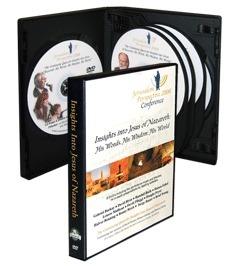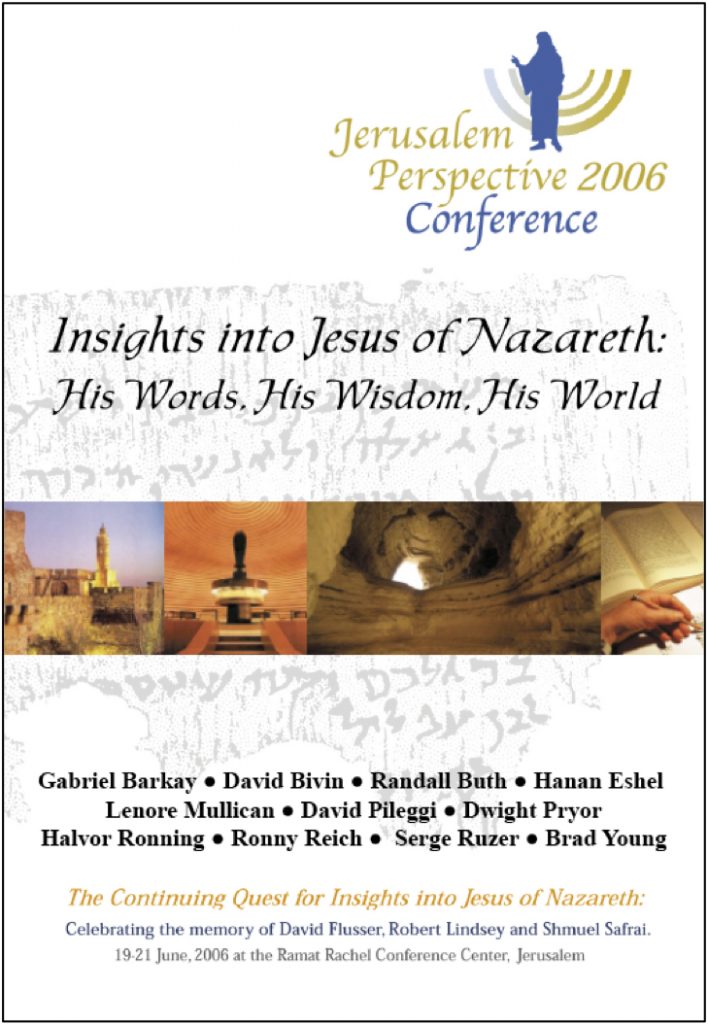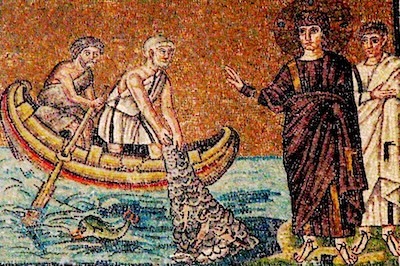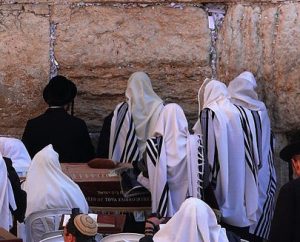 The prayer Jesus taught his disciples, The Lord’s Prayer, is most likely an abbreviated version of the Amidah (“Standing,” in Hebrew) or Eighteen Benedictions. I think it is important for Christians to be familiar with this central prayer of Jewish religious life.1
The prayer Jesus taught his disciples, The Lord’s Prayer, is most likely an abbreviated version of the Amidah (“Standing,” in Hebrew) or Eighteen Benedictions. I think it is important for Christians to be familiar with this central prayer of Jewish religious life.1
The prayer is very ancient, some of the changes to it being made 200 years before the time of Jesus. The prayer is also very beautiful, full of scriptural quotations and allusions. Every Jew was obligated to pray the Eighteen Benedictions daily. However, in times of emergency, one was permitted to pray a shortened form of the Eighteen, such as the Lord’s Prayer.
Rabbi Eliezer, a younger contemporary of Jesus, taught this abbreviation of the Eighteen:
May your will be done in heaven above, grant peace of mind to those who fear you [on earth] below, and do what seems best to you. Blessed are you, O LORD, who answers prayer.
Note the phrases “your will be done” and “in heaven above…[on earth] below” are both also found in the Lord’s Prayer. The Phrase “grant peace of mind” in the prayer Eliezer taught parallels the phrase “deliver us from evil” in the prayer Jesus taught.
The characterizations of God, which always follow “Blessed are you, O Lord”), can be used to summarize each benediction. If they are
strung together, they comprise a nice description of God:
God is the shield of Abraham, the one who revives the dead, the holy God, the gracious giver of knowledge, the one who delights in repentance, the one who is merciful and always ready to forgive, the redeemer of Israel, the healer of Israel’s sick, the one who blesses the years, the one who gathers Israel’s dispersed, the King who loves righteousness and justice, the one who smashes enemies and humbles the arrogant, the support and stay of the righteous, the one who rebuilds Jerusalem, the one who causes salvation to flourish, the one who hears prayer, the one who restores the divine presence to Zion, the one whose Name is the Beneficent One and to whom it is fitting to give thanks, and the one who blesses Israel with peace.
(Note that the headings summarize each benediction or blessing are for reference only, and are not recited.)
THE AMIDAH
1. THE GOD OF HISTORY:
Blessed are you, O Lord our God and God of our
fathers, the God of Abraham, the God of Isaac and the God of Jacob, the
great, mighty and revered God, the Most High God who bestows
lovingkindnesses, the creator of all things, who remembers the good deeds
of the patriarchs and in love will bring a redeemer to their children’s
children for his name’s sake. O king, helper, savior and shield.
Blessed are you, O Lord, the shield of Abraham.
2. THE GOD OF NATURE:
You, O Lord, are mighty forever, you revive the
dead, you have the power to save. [From the end of Sukkot until the eve
of Passover, insert: You cause the wind to blow and the rain to fall.]
You sustain the living with lovingkindness, you revive the dead with great
mercy, you support the falling, heal the sick, set free the bound and keep
faith with those who sleep in the dust. Who is like you, O doer of mighty
acts? Who resembles you, a king who puts to death and restores to life,
and causes salvation to flourish? And you are certain to revive the dead.
Blessed are you, O Lord, who revives the dead.
3. SANCTIFICATION OF GOD:
[Reader] We will sanctify your name in this world just as it is sanctified in the highest heavens, as it is written by your prophet: “And they call out to one another and say:
[Cong.] ‘Holy, holy, holy is the LORD of hosts; the whole earth is full of his glory.'” [Isa. 6:3]
[Reader] Those facing them praise God saying:
[Cong.] “Blessed be the Presence of the LORD in his place.” [Ezek. 3:12]
[Reader] And in your Holy Words it is written, saying,
[Cong.] “The LORD reigns forever, your God, O Zion, throughout all generations. Hallelujah.” [Ps. 146:10]
[Reader] Throughout all generations we will declare your greatness, and to all eternity we will proclaim your holiness. Your praise, O our God, shall never depart from our mouth, for you are a great and holy God and King. Blessed are you, O Lord, the holy God. You are holy, and your name is holy, and holy beings praise you daily. (Selah.) Blessed are you, O Lord, the holy God.
4. PRAYER FOR UNDERSTANDING:
You favor men with knowledge, and teach mortals understanding.
O favor us with the knowledge,
the understanding and the insight that come from you.
Blessed are you, O Lord, the gracious giver of knowledge.
5. FOR REPENTANCE:
Bring us back, O our father, to your Instruction;
draw us near, O our King, to your service;
and cause us to return to you in perfect repentance.
Blessed are you, O Lord, who delights in repentance.
6. FOR FORGIVENESS:
Forgive us, O our Father, for we have sinned;
pardon us, O our King, for we have transgressed; for you pardon and forgive.
Blessed are you, O Lord, who is merciful and always ready to forgive.
7. FOR DELIVERANCE FROM AFFLICTION:
Look upon our affliction and plead our cause,
and redeem us speedily for your name’s sake,
for you are a mighty redeemer.
Blessed are you, O Lord, the redeemer of Israel.
8. FOR HEALING:
Heal us, O Lord, and we will be healed;
save us and we will be saved, for you are our praise.
O grant a perfect healing to all our ailments,
for you, almighty King, are a faithful and merciful healer.
Blessed are you, O Lord, the healer of the sick of his people Israel.
9. FOR DELIVERANCE FROM WANT:
Bless this year for us, O Lord our God,
together with all the varieties of its produce, for our welfare.
Bestow ([from the 15th of Nissan insert:] dew and rain for) a blessing upon the
face of the earth. O satisfy us with your goodness, and bless our year
like the best of years.
Blessed are you, O Lord, who blesses the years.
10. FOR GATHERING OF EXILES:
Sound the great shofar for our freedom,
raise the ensign to gather our exiles,
and gather us from the four corners of the earth.
Blessed are you, O Lord, who gathers the dispersed of his people Israel.
11. FOR THE RIGHTEOUS REIGN OF GOD:
Restore our judges as in former times,
and our counselors as at the beginning; and remove from us sorrow and
sighing. Reign over us, you alone, O Lord, with lovingkindness and
compassion, and clear us in judgment. Blessed are you, O Lord, the King
who loves righteousness and justice.
12. FOR THE DESTRUCTION OF APOSTATES AND
THE ENEMIES OF GOD:
Let there be no hope for slanderers,
and let all wickedness perish in an instant.
May all your enemies quickly be cut down,
and may you soon in our day uproot, crush, cast down
and humble the dominion of arrogance.
Blessed are you, O Lord, who smashes enemies and humbles the arrogant.
13. FOR THE RIGHTEOUS AND PROSELYTES:
May your compassion be stirred, O Lord our God,
towards the righteous, the pious, the elders of your people
the house of Israel, the remnant of their scholars, towards proselytes,
and towards us also. Grant a good reward to all who truly trust in your
name. Set our lot with them forever so that we may never be put to shame,
for we have put our trust in you.
Blessed are you, O Lord, the support and stay of the righteous.
14. FOR THE REBUILDING OF JERUSALEM:
Return in mercy to Jerusalem your city, and dwell in it as you have promised.
Rebuild it soon in our day as an eternal structure,
and quickly set up in it the throne of David.
Blessed are you, O Lord, who rebuilds Jerusalem.
15. FOR THE MESSIANIC KING:
Speedily cause the offspring of your servant David to flourish,
and let him be exalted by your saving power,
for we wait all day long for your salvation.
Blessed are you, O Lord, who causes salvation to flourish.
16. FOR THE ANSWERING OF PRAYER:
Hear our voice, O Lord our God; spare us and have pity on us.
Accept our prayer in mercy and with favor,
for you are a God who hears prayers and supplications.
O our King, do not turn us away from your presence empty-handed,
for you hear the prayers of your people Israel with compassion.
Blessed are you, O Lord, who hears prayer.
17. FOR RESTORATION OF TEMPLE SERVICE:
Be pleased, O Lord our God, with your people Israel and with their prayers.
Restore the service to the inner sanctuary of your Temple,
and receive in love and with favor both the fire-offerings of Israel and their prayers.
May the worship of your people Israel always be acceptable to you.
And let our eyes behold your return in mercy to Zion.
Blessed are you, O Lord, who restores his divine presence to Zion.
18. THANKSGIVING FOR GOD’S UNFAILING MERCIES:
We give thanks to you that you are the Lord our God
and the God of our fathers forever and ever.
Through every generation you have been the rock of our lives, the shield
of our salvation. We will give you thanks and declare your praise for our
lives that are committed into your hands, for our souls that are entrusted
to you, for your miracles that are daily with us, and for your wonders and
your benefits that are with us at all times, evening, morning and noon.
O beneficent one, your mercies never fail; O merciful one,
your lovingkindnesses never cease. We have always put our hope in you.
For all these acts may your name be blessed and exalted continually,
O our King, forever and ever. Let every living thing give thanks to you and
praise your name in truth, O God, our salvation and our help. (Selah.)
Blessed are you, O Lord, whose Name is the Beneficent One,
and to whom it is fitting to give thanks.
19. FOR PEACE:
Grant peace, welfare, blessing, grace, lovingkindness and mercy to us
and to all Israel your people. Bless us, O our Father, one and
all, with the light of your countenance; for by the light of your
countenance you have given us, O Lord our God, a Torah of life,
lovingkindness and salvation, blessing, mercy, life and peace.
May it please you to bless your people Israel at all times and in every hour with your peace.
Blessed are you, O Lord, who blesses his people Israel with peace.
~~~~
1 The prayer is known as the “Eighteen” because it originally consisted of eighteen benedictions. The twelfth benediction (against apostates) was added around 70 AD. For more on this topic, see New Light on the Difficult Words of Jesus by David Bivin (En-Gedi, 2007).
Photos: MathKnight and Zachi Evenor [CC BY 3.0], Praying Hands by jill, jellidonut… whatever [CC BY-SA 2.0]

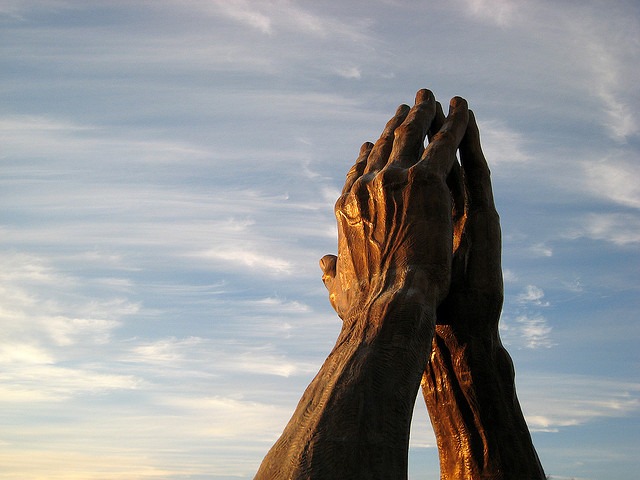






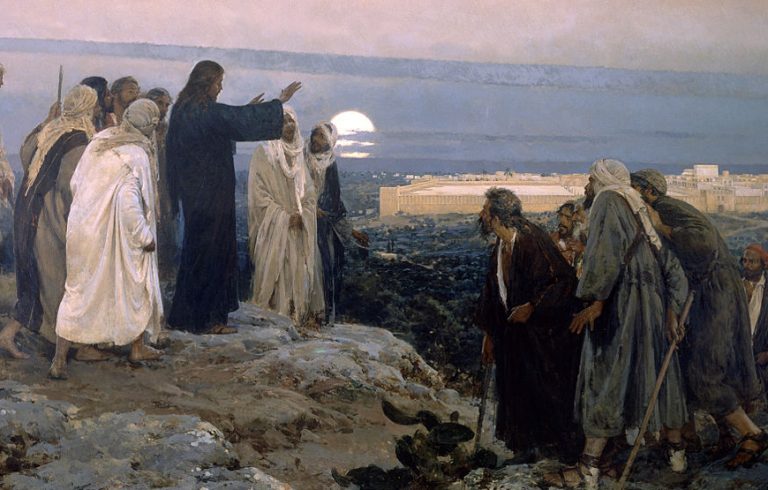
 Jesus also alluded to the rigors of the peripatetic life of a sage when he said, “Foxes have holes and birds of the air have nests, but the Son of Man has nowhere to lay his head” (Luke 9:57-58). The burden Jesus’ disciples had to bear was a heavy one, but not unlike what disciples of other first-century sages had to bear, and would not have been considered extreme by the standards of first-century Jewish society.
Jesus also alluded to the rigors of the peripatetic life of a sage when he said, “Foxes have holes and birds of the air have nests, but the Son of Man has nowhere to lay his head” (Luke 9:57-58). The burden Jesus’ disciples had to bear was a heavy one, but not unlike what disciples of other first-century sages had to bear, and would not have been considered extreme by the standards of first-century Jewish society.
